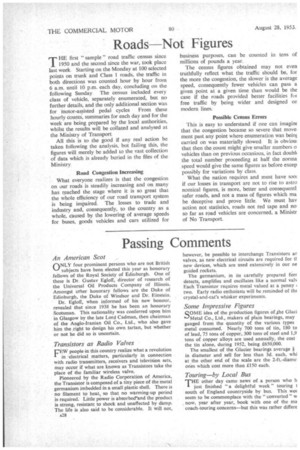Passing Comments
Page 30

Page 31

If you've noticed an error in this article please click here to report it so we can fix it.
An American Scot
QNLY four prominent persons who are not British subjects have been elected this year as honorary fellows of the Royal Society of Edinburgh. One of these is Dr. Gustav Egloff, director of research of the Universal Oil Products Company of Illinois. Amongst other honorary fellows are the Duke of Edinburgh, the Duke of Windsor and Dr. Einstein.
Dr. Eglolf, when informed of his new honour, revealed that since 1938 he has been an honorary Scotsman. This nationality was conferred upon him in Glasgow by the late Lord Cadman, then chairman of the Anglo-Iranian Oil Co., Ltd., who also gave him the right to design his own tartan, but whether or not he did so is uncertain.
Transistors as Radio Valves
FEW people-in this country realize what a revolution in -electrical matters, particularly in connection with radio transmitters, receivers and television sets, may occur if what are known as Transistors take the place of the familiar wireless valve.
Pioneered by the Radio Corporation of America, the Transistor is composed of a tiny piece of the metal germanium imbedded in a small plastic shell. There is no filament to heat„, so that no warming-up period is required. Little power is absorbecrand the product is strong, resistant to shock and unaffected by damp. The life is also said to be considerable. It will not,
A28
however, be possible to interchange Transistors an valves, as new electrical circuits are required for ti new devices, which are used extensively in our ne guided rockets.
The germanium, in its carefully prepared forr detects, amplifies and oscillates like a normal vaTs Each Transistor requires metal valued at a penny two. Early radio enthuiasts will be reminded of the crystal-and-cat's whisker experiments.
Some Impressive Figures
S0ME idea of the production figures of Abe Glad Metal Co., Ltd., makers of plain bearings, may gauged from the quantity of the various types metal consumed. Nearly 700 tons of tin, 180 to of lead, 75 tons of copper, 300 tons of steel and 1,9 tons of copper alloys are used annually, the cost the tin alone, during 1952, being £650,000.
The smallest of the Glacier bearings average in diameter and sell for less than 3d. each, whi at the other end of the scale are the 2-ft-diamu ones which cost more than £.150 each.
Touring—by Local Bus
THE other day came news of a person who h just finished "a delightful week" touring I south of England countryside by bus. This woi seem • to be commonplace with the " converted " w , now, year after year,. book with one of the ma coach-touring concerns—but this was rather differe
nstead of the luxuriously appointed coaches which re now accepted as normal by holidaymakers, this erson travelled along the coast from Folkestone to Veymouth on the top decks of ordinary buses operatig on local services. From these she had a good view of the countryde, spending the night where she fancied, staying one place as long as she liked and, above all, finding at the holiday was cheap.
7oodyear's Safety Ramps
rip reduce the possibility of accidents on the roads in their factory area, the Goodyear Tyre and :ubber Co. (Great Britain), Ltd., Wolverhampton, ave laid down a number of 3-in, ramps across the )ads at danger points as a means for forcing drivers f lorries and other vehicles to slow down. These itentional obstructions are strikingly painted in Iternate black and gold stripes and warning signs ave been sited at distances of 75 ft. from each as signal to drivers to slacken speed.
The ramps are 12 in. wide and have a 45-degree camber. They are made of concrete. In the two years in which they have been in use, they have proved highly effective.
Now Jaunting Cars
MEWS from Ireland that jaunting cars at Killarney " are to be replaced by a bus service is not the presage of a revolution, moreover, it is interesting to note, this innovation has not been found desirable just because buses can offer improved passenger comfort or greater economy. Apparently Coras Iompair Eireann have made the change because they cannot guarantee that sufficient jaunting cars will be available there. This is on account of a dispute which has arisen amongst local " jarvies."
Seriously, though, the general feeling among tourists—bus operators included—in Irelandwould probably be one of sorrow if this unique means for transport were replaced generally. After all, one can travel in a coach or bus any day.




















































































